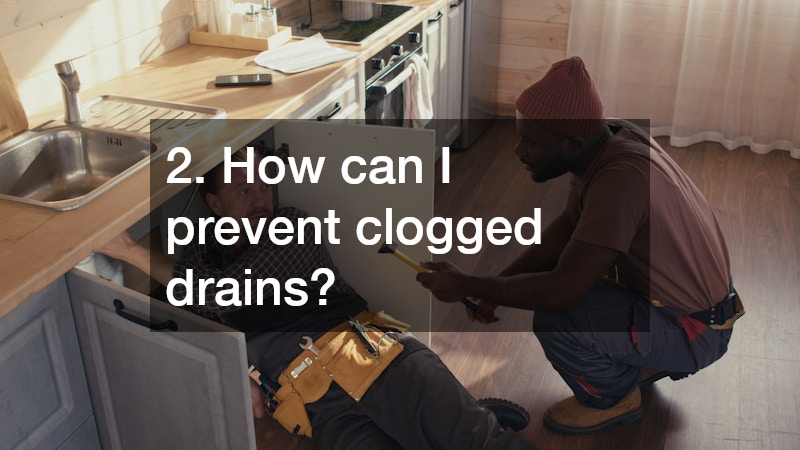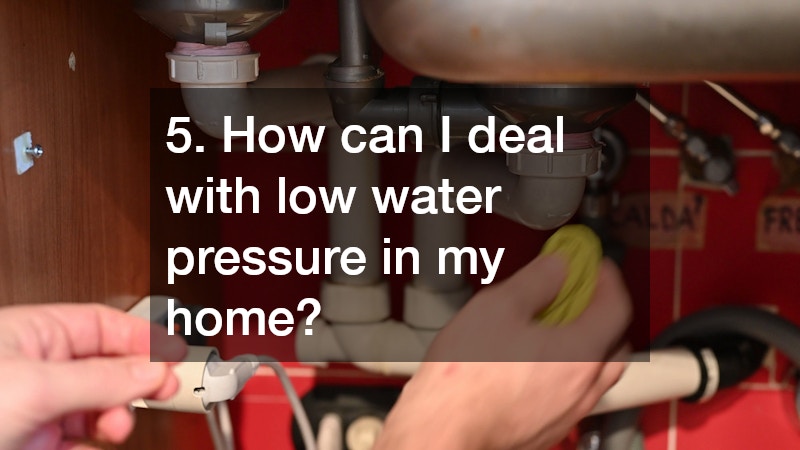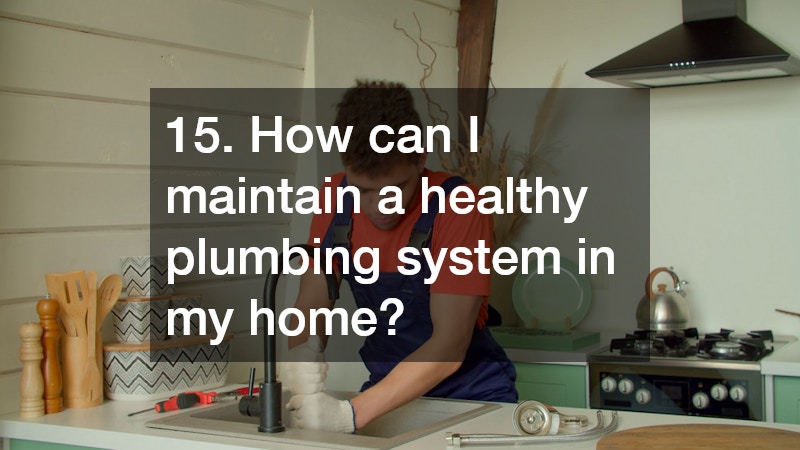

Welcome to the new homeowner’s guide to general plumbing needs. In this comprehensive guide, we will cover everything you need to know about maintaining and troubleshooting your home’s plumbing system.
1. What are the common signs of a plumbing problem?
When it comes to general plumbing needs, it’s important to be aware of the common signs that indicate a problem in your system. One common sign is leaking fixtures, which can lead to water damage and higher water bills if not addressed promptly. Another sign to watch out for is slow drainage, which may indicate a clog in your pipes that needs to be cleared.
If you notice any of these signs in your home, it’s important to reach out to residential plumbers or a local plumbing service to diagnose and fix the issue before it gets worse.
Regular maintenance and inspections can also help catch potential general plumbing needs early on and prevent costly repairs down the line. By staying vigilant and addressing issues promptly, you can keep your plumbing system running smoothly.

2. How can I prevent clogged drains?
Clogged drains are one of the most common general plumbing needs in many homes, but there are steps you can take to prevent them from occurring. One way to prevent clogs is by properly disposing of food scraps and avoiding pouring grease down the drain, as these can solidify and cause blockages.
Regular use of a drain cleaner can also help prevent clogs by breaking down any buildup in your pipes and keeping them clear. Additionally, installing drain covers can help catch hair and debris before they can cause a clog in your plumbing system.
If you do encounter a clog, it’s best to contact local plumbers or a plumbing service to safely and effectively clear the blockage without causing further damage to your pipes.
3. How often should I have my water heater serviced?
Water heater maintenance is an essential part of your general plumbing needs to ensure that you have access to hot water when you need it. One important step in water heater maintenance is checking for leaks, as any leaks can indicate a problem that needs to be addressed promptly.
Flushing the tank of your water heater regularly can also help remove sediment buildup and prolong the life of your unit. It’s recommended to have your water heater serviced by a professional plumber at least once a year to ensure it’s running efficiently and to catch any potential issues early on.
If you notice any changes in the performance of your water heater, such as inconsistent water temperatures or unusual noises, it’s best to contact a water heater repair service for a thorough inspection and necessary repairs.
4. What should I do in case of a burst pipe?
A burst pipe is a serious plumbing emergency that requires immediate attention to prevent water damage to your home. In the event of a burst pipe, the first step is to shut off the main water supply to your home to stop the flow of water and minimize damage.
It’s crucial to contact a plumber or emergency plumbing service right away to assess the situation and repair the burst pipe. While waiting for the plumber to arrive, you can try to contain the leak by placing a bucket under the pipe and turning on nearby faucets to drain any remaining water in the pipes.
Once the burst pipe has been repaired, it’s important to inspect your plumbing system for any other potential issues that could lead to future leaks. Regular inspections and maintenance can help prevent burst pipes and other plumbing emergencies in the future.

5. How can I deal with low water pressure in my home?
Low water pressure can be a frustrating issue to deal with, but there are several steps you can take to improve it in your home. One common cause of low water pressure is leaks in the pipes, which can reduce the flow of water to your fixtures.
Installing a water pressure regulator can help regulate the water pressure in your home and prevent fluctuations that can affect your showers and appliances. If you continue to experience low water pressure despite these efforts, it’s best to contact local plumbers to diagnose the issue and recommend the best course of action.
By addressing low water pressure promptly, you can ensure that your plumbing system is functioning efficiently and that you have access to an adequate supply of water for your daily needs.
6. What are the benefits of installing a water filtration system?
Installing a water filtration system is a great way to improve the quality of your drinking water and ensure that it’s free from harmful contaminants. One of the main benefits of a water filtration system is that it can improve the taste of your drinking water by removing impurities and chemicals that can affect its flavor.
Another benefit of a water filtration system is that it can remove harmful contaminants such as lead, chlorine, and bacteria, which can pose health risks if consumed. By investing in a water filtration system, you can enjoy clean, great-tasting water straight from your tap without the need for bottled water.
When considering installing a water filtration system in your home, it’s best to consult with plumbing contractors or a local water heater company to determine the best type of system for your needs. They can help you choose a system that fits your budget and effectively filters out the contaminants in your water supply.
7. How can I prevent frozen pipes during winter?
Frozen pipes are a common issue during the winter months, but there are steps you can take to prevent them from occurring in your home. One effective way to prevent frozen pipes is by insulating exposed pipes in unheated areas of your home, such as basements, attics, and crawl spaces.
Allowing a slow drip from faucets during extremely cold weather can also help prevent pipes from freezing by relieving pressure in the pipes and keeping water flowing. Additionally, keeping your home’s temperature above freezing at all times can help protect your pipes from freezing and bursting.
If you do encounter frozen pipes in your home, it’s important to thaw them out slowly using a hairdryer or heat lamp to avoid causing damage to the pipes. If you’re unable to thaw the pipes yourself, it’s best to contact a plumber or plumbing service for assistance with timely plumbing repairs.
8. Should I replace my old plumbing fixtures with new ones?
Upgrading your old plumbing fixtures with new ones is a great way to improve the efficiency and aesthetics of your home. One of the primary benefits of replacing old plumbing fixtures is that it can improve water efficiency by reducing water wastage and lowering your monthly water bills.
Updating the look of your home with modern plumbing fixtures can also increase your home’s resale value and enhance its overall appearance. Whether you’re looking to upgrade your kitchen faucet, showerhead, or toilet, investing in new fixtures can bring a fresh new look to your home.
When considering replacing your plumbing fixtures, it’s best to consult with residential plumbers or a plumbing contractor to ensure that the new fixtures are compatible with your existing plumbing system. They can help you choose fixtures that meet your needs and budget while ensuring a proper installation.

9. How do I know if my toilet is running efficiently?
Checking your toilet for efficiency is an important part of your general plumbing needs to ensure that it’s functioning properly. One way to determine if your toilet is running efficiently is by checking for leaks in the tank, which can waste a significant amount of water if left untreated.
If you suspect that your toilet is not running efficiently, it’s best to contact a plumber or plumbing service to inspect it and make any necessary repairs. By addressing issues with your toilet promptly, you can save water and reduce your water bills over time.
10. What are the benefits of a tankless water heater?
Investing in a tankless water heater is a great way to enhance your home’s energy efficiency and ensure you have a reliable supply of hot water. One of the primary benefits of a tankless water heater is its energy efficiency, as it only heats water as needed, reducing energy consumption and lowering your utility bills.
When considering a tankless water heater service, it’s best to consult with a local water heater company or plumber to determine the right size and model for your home. They can help you choose a tankless water heater that meets your hot water needs while maximizing energy savings.
11. When should I replace my sewer line?
Replacing your sewer line is a major undertaking that requires careful consideration and planning. One sign that it’s time to replace your sewer line is if you notice signs of a damaged line, such as sewage backups, foul odors, or water pooling in your yard.
If you suspect that your sewer line needs to be replaced, it’s best to contact plumbing contractors or a sewer line repair service to assess the situation and recommend the best course of action. They can provide you with an estimate for the replacement and guide you through the process to ensure a successful installation.
12. How can I reduce water wastage in my home?
Reducing water wastage is an important aspect of your general plumbing needs to conserve water and lower your utility bills. One effective way to reduce water wastage is by installing water-saving fixtures such as low-flow faucets, showerheads, and toilets, which can significantly reduce water consumption in your home.
Regularly monitoring your water usage and making small changes to your daily habits, such as turning off the faucet while brushing your teeth or taking shorter showers, can also help reduce water wastage in your home. By practicing water conservation habits, you can contribute to a more sustainable future and lower your environmental impact and general plumbing needs.
13. What are the main causes of water leaks in homes?
Water leaks are a common plumbing issue that can lead to water damage and higher water bills if not addressed promptly. High water pressure is one of the main causes of water leaks in homes, as it can put excessive strain on your pipes and fixtures, leading to leaks and bursts.
If you suspect a water leak in your home, it’s important to contact local plumbers or a plumbing service to identify the source of the leak and make necessary repairs. By addressing water leaks promptly, you can protect your home from water damage and reduce your water wastage.
14. When is it time to replace my water heater?
Knowing when to replace your water heater is crucial for ensuring that you have access to hot water when you need it. One sign that it’s time to replace your water heater is its age, as most water heaters have a lifespan of 8-12 years and become less efficient over time.
When considering replacing your water heater, it’s best to consult with a water heater repair service or local plumbers to determine the right size and type of water heater for your home. They can help you choose an energy-efficient model that meets your hot water needs while keeping your utility bills in check.

15. How can I maintain a healthy plumbing system in my home?
Maintaining a healthy plumbing system is essential for preventing costly repairs and ensuring that your home’s plumbing functions efficiently. One key way to maintain a healthy plumbing system is by scheduling regular inspections and maintenance with a professional plumber to catch potential issues early on.
Hiring a professional plumber when needed for repairs and installations can also help ensure that your plumbing system is properly maintained and functioning at its best. Whether you need to repair a leaky faucet or install a new water heater, it’s best to leave it to the experts to prevent further damage and ensure a quality installation.
By following the tips and advice outlined in this guide for general plumbing needs, you can keep your home’s plumbing system in top condition for years to come. Remember to stay proactive, address issues promptly, and seek professional help when needed to maintain a healthy plumbing system in your home.
Congratulations on completing the new homeowner’s guide to general plumbing needs. By following the tips and advice outlined in this guide, you can ensure that your home’s plumbing system remains in top condition for years to come.

